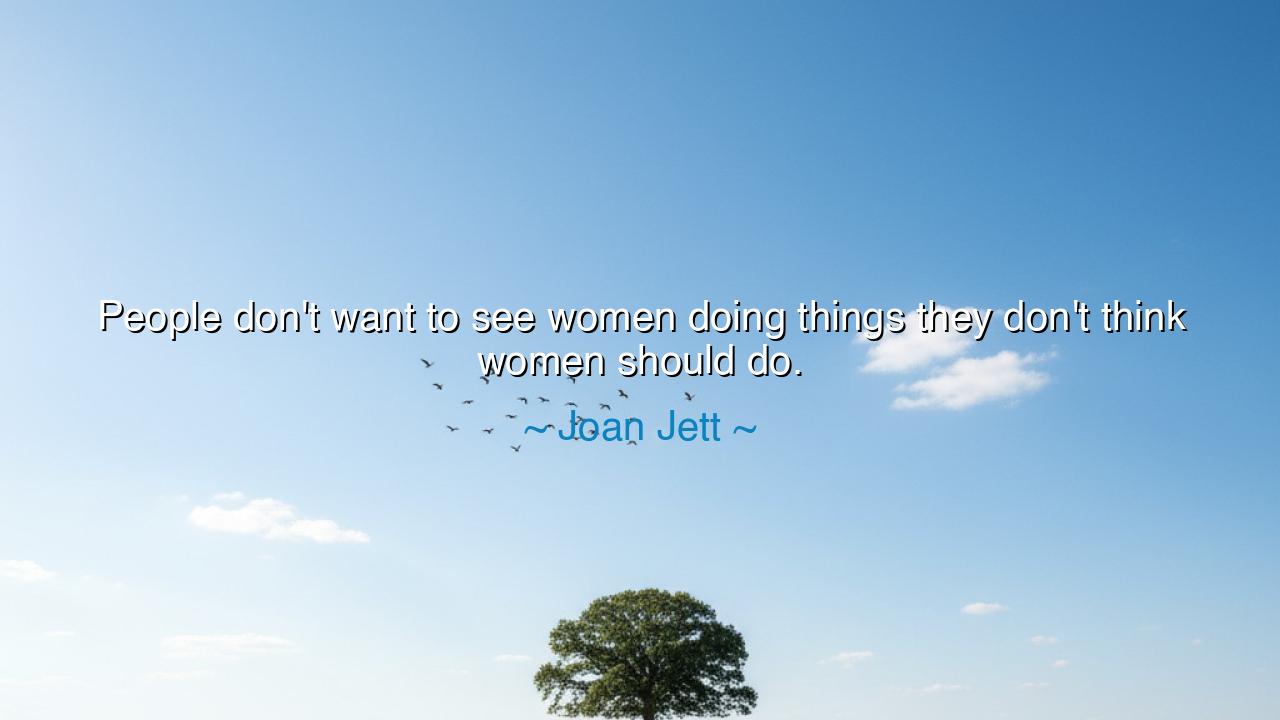
People don't want to see women doing things they don't think






The words of Joan Jett, “People don’t want to see women doing things they don’t think women should do,” cut through centuries of expectation like a blade. They speak of the invisible chains forged not from iron, but from belief—the prison of perception that declares what is proper, and condemns what is not. She names the truth that rebellion is not only an act of action but of existence: when a woman steps beyond the narrow path society has drawn, she becomes both a vision of hope and a target of scorn.
The origin of this struggle lies in the long story of patriarchy, where the world prescribed for women only certain duties—domestic service, motherhood, silence in public matters. To step beyond these was to invite criticism, ridicule, or worse. Jett herself, a pioneer in rock music, faced such hostility. For the sight of a woman wielding an electric guitar with fire and defiance was, to many, an act of disobedience against the order they believed unshakable.
Consider the tale of Joan of Arc, a peasant girl who donned armor and led armies in defiance of every expectation of her sex. To some she was a saint, to others a heretic, but to all she was unsettling—for she was doing what women were not supposed to do. Her courage shook kings and priests alike, and though she was condemned by her enemies, her name has lived on for centuries, a testament to the truth Jett proclaimed.
Jett’s words are also a mirror to the present. Even now, women who dare to command in politics, to create in the arts, or to rise in business encounter the same resistance, cloaked in subtler forms. They are told they are “too ambitious,” “too emotional,” or “unfeminine.” The discomfort of others reveals not weakness in the women, but fear in the observers—a fear of the crumbling of old orders.
The lesson is sharp and heroic: progress is never gentle. Each time a woman steps beyond the boundary, she breaks not only the chain for herself, but weakens it for those who will come after. That discomfort, that anger, is the sound of walls falling. To do what women are told they “should not” is, in truth, to reveal what women always could.
Let future generations remember: the world has always resisted those who defy its narrow vision, yet it is only through such defiance that humanity grows. Women who do what others say they must not are not threats to order, but builders of freedom. And though society may recoil at first, it is always those very acts that light the way for those who follow.






MTNguyen Mai Trang
Joan Jett’s quote is powerful because it speaks to the ongoing issue of gender expectations. It seems that when women step into roles or activities that are typically seen as male-dominated, there’s often resistance. Why do we continue to perpetuate these narrow views about what women should or shouldn’t do? How do we reshape this narrative and empower women to break free from these stereotypes without being judged for their choices?
HNHa Nguyen
Joan Jett’s words make me reflect on how much society still tries to dictate what women can or can’t do. It’s frustrating how women are often held to different standards than men, especially when it comes to roles in music or leadership. What can we do to challenge and break down these barriers? How do we encourage more women to embrace their unique talents and defy these societal limitations without fear of criticism?
TNtuyen Nguyen
Joan Jett’s quote reflects a reality that many women continue to face today—being judged for pursuing their passions, especially when those passions defy traditional gender expectations. But isn’t it time we normalize women breaking boundaries and doing what they love, without fear of judgment? How can we shift societal perceptions so that women’s achievements and interests are celebrated, not seen as a deviation from the norm?
TMTriet Tran Minh
I can’t help but agree with Joan Jett. There’s still a tendency to discourage women from doing things that step outside the expected boundaries. Whether it's women in rock music, women in leadership, or women excelling in STEM, why does society feel threatened when women step outside the box? How do we dismantle these rigid gender expectations and encourage women to pursue whatever they are passionate about, without facing backlash?
NTVu Nhu Thao
Joan Jett’s statement resonates because it speaks to the deep-rooted bias many women face when they step into spaces that have traditionally been dominated by men. The idea that people don’t want to see women doing things they don’t think women should do reflects a larger issue of societal control over women's freedom of expression. How do we change the narrative so that women can be seen as fully capable individuals, regardless of what society deems 'appropriate' for them?